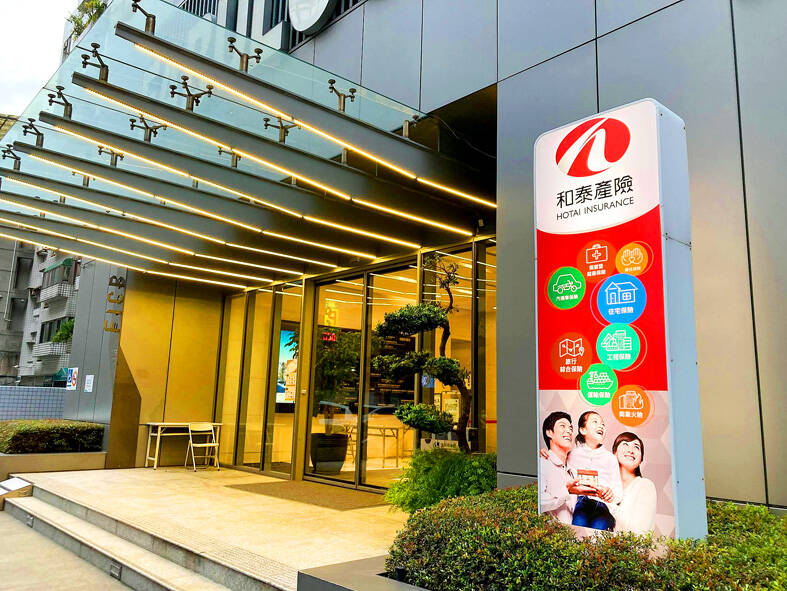The Financial Supervisory Commission (FSC) on Thursday ordered four non-life insurance companies to raise new capital by the end of June after their capital solvency conditions worsened due to massive COVID-19 insurance policy payments.
At the end of last year, CTBC Insurance Co (中國信託產險), Fubon Insurance Co (富邦產險), Tokio Marine Newa Insurance Corp (新安東京海上產險) and Hotai Insurance Co (和泰產險) failed to meet risk-based capital (RBC) ratios, the commission said.
The FSC uses the ratio to gauge an insurer’s capital adequacy, setting 50 percent as the regulatory minimum and 200 percent as a healthy level.

Photo courtesy of Hotai Insurance Co
All four insurers’ RBC ratios fell into negative territory at the end of last year, as they suffered heavy losses due to massive compensation to COVID-19 policyholders, the commission said.
The four companies must restore their solvency levels by raising fresh capital by the end of June, or they would be taken over by the commission within 90 days, it said.
Fubon Insurance had an RBC ratio of minus-37.25 percent, while Hotai Insurance had an RBC ratio of minus-321 percent, Tokio Marine Newa Insurance minus-1,078 percent and CTBC Insurance minus-1,680 percent, FSC data showed.
Fubon Insurance’s board of directors yesterday approved a plan to issue 1 billion new common shares via a private placement, as the insurer’s accumulated losses have exceeded half of its share capital, its parent Fubon Financial Holding Co (富邦金控) said in a statement to the Taiwan Stock Exchange.
Fubon Insurance aims to raise NT$16 billion this time after a capital injection of NT$15 billion in August last year to address the problem.
Hotai Insurance plans to scrap NT$4.5 billion from its share capital to absorb losses and then raise NT$4.5 billion by issuing 450 million common shares via a private placement to improve its financial status, its parent Hotai Motor Co (和泰汽車) said in a filing to the Taiwan Stock Exchange yesterday.
Hotai Insurance last year raised NT$20 billion and NT$6 billion after two separate share issues.
Another insurer, Chung Kuo Insurance Co (兆豐產險), had an RBC ratio of minus-8.8 percent at the end of last year, but was able to restore it to 200 percent after a fresh capital injection of NT$6 billion, the commission said.
Overall, the nation’s six major non-life insurers that sold a majority of the COVID-19 insurance policies have raised fresh capital of NT$112.5 billion to increase their adequacy ratios, the commission’s data showed.
Meanwhile, Mercuries Life Insurance Co (三商美邦人壽保險) and Hontai Life Insurance Co (宏泰人壽) are required to submit plans to enhance their capital adequacy as their equity-to-assets ratio have slid below 3 percent, the commission added.
The capital inadequacy issues mark the latest challenge facing local insurers after rate hikes and tumbling stock markets.
Additional reporting by Lisa Wang

POWERING UP: PSUs for AI servers made up about 50% of Delta’s total server PSU revenue during the first three quarters of last year, the company said Power supply and electronic components maker Delta Electronics Inc (台達電) reported record-high revenue of NT$161.61 billion (US$5.11 billion) for last quarter and said it remains positive about this quarter. Last quarter’s figure was up 7.6 percent from the previous quarter and 41.51 percent higher than a year earlier, and largely in line with Yuanta Securities Investment Consulting Co’s (元大投顧) forecast of NT$160 billion. Delta’s annual revenue last year rose 31.76 percent year-on-year to NT$554.89 billion, also a record high for the company. Its strong performance reflected continued demand for high-performance power solutions and advanced liquid-cooling products used in artificial intelligence (AI) data centers,

SIZE MATTERS: TSMC started phasing out 8-inch wafer production last year, while Samsung is more aggressively retiring 8-inch capacity, TrendForce said Chipmakers are expected to raise prices of 8-inch wafers by up to 20 percent this year on concern over supply constraints as major contract chipmakers Taiwan Semiconductor Manufacturing Co (TSMC, 台積電) and Samsung Electronics Co gradually retire less advanced wafer capacity, TrendForce Corp (集邦科技) said yesterday. It is the first significant across-the-board price hike since a global semiconductor correction in 2023, the Taipei-based market researcher said in a report. Global 8-inch wafer capacity slid 0.3 percent year-on-year last year, although 8-inch wafer prices still hovered at relatively stable levels throughout the year, TrendForce said. The downward trend is expected to continue this year,

Vincent Wei led fellow Singaporean farmers around an empty Malaysian plot, laying out plans for a greenhouse and rows of leafy vegetables. What he pitched was not just space for crops, but a lifeline for growers struggling to make ends meet in a city-state with high prices and little vacant land. The future agriculture hub is part of a joint special economic zone launched last year by the two neighbors, expected to cost US$123 million and produce 10,000 tonnes of fresh produce annually. It is attracting Singaporean farmers with promises of cheaper land, labor and energy just over the border.

US actor Matthew McConaughey has filed recordings of his image and voice with US patent authorities to protect them from unauthorized usage by artificial intelligence (AI) platforms, a representative said earlier this week. Several video clips and audio recordings were registered by the commercial arm of the Just Keep Livin’ Foundation, a non-profit created by the Oscar-winning actor and his wife, Camila, according to the US Patent and Trademark Office database. Many artists are increasingly concerned about the uncontrolled use of their image via generative AI since the rollout of ChatGPT and other AI-powered tools. Several US states have adopted